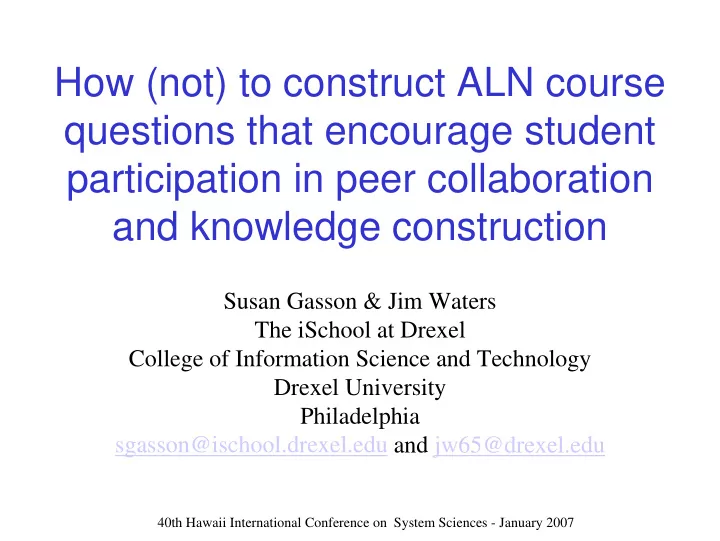

How (not) to construct ALN course questions that encourage student participation in peer collaboration and knowledge construction Susan Gasson & Jim Waters The iSchool at Drexel College of Information Science and Technology Drexel University Philadelphia sgasson@ischool.drexel.edu and jw65@drexel.edu 40th Hawaii International Conference on System Sciences - January 2007
… but questions are questions, surely - what is different about online settings ? • 1 raised hand = 20 emails • Negotiating the meaning of question may take several iterations • Physical isolation leads to inertia (lurking) – need peer thought leaders to generate momentum • Greater potential for reflection and deeper debate over a longer time period, lets exploit that 40th Hawaii International Conference on System Sciences - January 2007
Know your cohort • Domain knowledge (Achilles tendon) • Need to identify thought-leaders – Facilitation, moderation, reconciliation – Challenging – Social facilitation • Balance between democratic debate, clique behavior and tumbleweeds • Identification with group aims and behavior 40th Hawaii International Conference on System Sciences - January 2007
Good , bad or average ? 40th Hawaii International Conference on System Sciences - January 2007
Good , bad or average II 40th Hawaii International Conference on System Sciences - January 2007
Good Question 40th Hawaii International Conference on System Sciences - January 2007
Average Question 40th Hawaii International Conference on System Sciences - January 2007
Bad Question 40th Hawaii International Conference on System Sciences - January 2007
Good questions tended to be • First question in the week • Early weeks better than later weeks • Open questions but bounded • Permitted students to call upon their personal experience with IT or organizations • Permitted many ways to approach the issues. 40th Hawaii International Conference on System Sciences - January 2007
Bad questions tended to be • Following a highly-interactive question • Cognitively complex (containing multiple parts that needed to be considered in turn), • Overly abstract, so students could not draw on their personal experience. • Questions set in later weeks were much less interactive and constructive across the class than questions set in earlier weeks. 40th Hawaii International Conference on System Sciences - January 2007
A Checklist For Question Design 1. Does the question structure relate clearly to course content (explicit knowledge domain learning goals as perceived by students) - i.e. what do they think they are there to learn? 2. Does the question knowledge domain relate clearly to students' professional interests - i.e. does answering this question move them nearer to accomplishing their career/job goal? 3. Does the question knowledge domain draw on either (a) students' prior experience, or (b) students' vicarious experience (communicated through course readings or discussion) - i.e. do students have the expertise or experience to answer the question? 4. Does the question structure reflect a single knowledge domain, with a single problem-solving goal - i.e. is there a single problem to be solved (or a set of aligned/incremental sub-problems relating to a single knowledge domain), or have you presented students with multiple, incompatible problems or knowledge domains to reconcile? 40th Hawaii International Conference on System Sciences - January 2007
Conclusions • Try and draw on the cohort’s experience • Identify student learning objectives and interests • Identify thought leaders early in the course and encourage these to participate heavily in later weeks • Set questions that are open but bounded • Provide strong background material for students to read • Intervene when necessary - but keep watching the skies • Be prepared to change the question if it is failing to engage students – students, like politicians may often change the question themselves … ☺ 40th Hawaii International Conference on System Sciences - January 2007
Recommend
More recommend